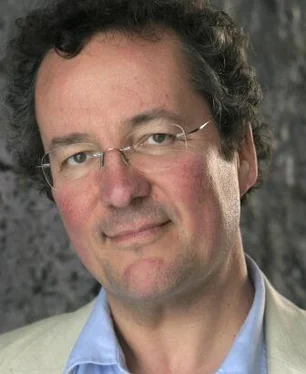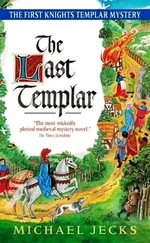‘There’s no sign of footprints,’ Baldwin said, peering about.
Simon was walking in a circle at some distance, trying to see whether there was any mark in the dry soil or clue left in the scrubby plants. He then extended his search by some yards, but found nothing of interest. It was only when he looked in the shade of a small tree some forty yards distant that he saw the first of the hoofprints.
One set was broader, belonging to a bigger, heavier horse, for where they crossed the other hoofprints, they were set deeper into the soil. ‘Baldwin!’
The knight and the Galician investigator joined him. Baldwin touched the dusty marks gently. ‘There’s little doubt that these are recent,’ he concluded. ‘The rain would have destroyed them, so I assume these horses were here after the rains.’
‘This tree – surely they came here and tied their mounts to it?’ Simon suggested.
Baldwin frowned. ‘A man could have ridden here with her, and when he saw that they were alone, he decided to take advantage. He and she stopped, probably to take refreshment from the waters, and both tied their mounts to the tree. But then he revealed his genuine desires.’
‘Perhaps.’ Señor Munio jerked his head to the cart, and the cleric began storing his parchment, inks and reeds in his scrip. ‘But it’s all guesswork. For now, I must return to the city and question the gatekeepers in case they saw someone like this woman leaving the place earlier.’
Baldwin smiled. It was clear enough that the Pesquisidor expected Simon and he to join him. In his position, Baldwin would have demanded the same. ‘There is another possible explanation,’ he said. ‘I heard today that this morning there was an attack on a group of pilgrims just outside the city. Perhaps this was another band of thieves, who simply happened upon a young and attractive woman and decided to enjoy her body. Maybe it was not her horse: there were two men, one with a smaller horse than his companion’s. They had travelled here together and caught sight of this pretty young woman. One captured her, the other tied their horses, and then they both raped her. Overwhelmed with fear for their own lives in case she denounced them, they then beat her to death.’
‘It is as likely as any other explanation,’ Munio shrugged.
‘And as a story, it holds this advantage,’ Baldwin said. ‘If you spread this tale and the real killer is in Compostela still, he will think himself safe. That might give you more time to discover the truth.’
Simon nodded, and gruffly said, ‘And thank you for not arresting us.’
Munio’s face was curiously still as he glanced at the Bailiff. ‘There is still time, Señor.’
As the sun passed slowly across the sky, Doña Stefanía grew anxious. What was taking Joana so long? The place of the rendezvous had been chosen because it was almost in hail of the city walls, easy for both to get to, easy for both to escape from.
The bastard, making use of her shame in this way! It was disgraceful that a knight should act in such a manner, demanding cash in exchange for his silence. Not that it would necessarily be the end of the matter. Doña Stefanía was a woman who had lived in the real world all her life, even if nominally she was supposed to be cloistered now in her abbey. As a lady, before she took up the cloth, she had travelled widely, and she still did so at every opportunity. She was not naïve enough to believe that a blackmailer would make his demands once only and then forget her indiscretion. No. Any man who was foul enough to rob her in this manner, would try it more than once.
She was really worried now. It was growing late and there was no sign of her maid. What had happened to Joana? The meeting should have been over hours ago.
After some little while, she heard a rumour passing along the street and glanced up, wondering what the noise might portend.
It was a curious noise, almost hushed, as though the crowd was talking more, but less loudly, out of some form of respect, and she wondered for a moment or two whether this might be a religious procession; however she knew that there was no religious significance to the day or to the hour. In any case, a procession would emanate from the Cathedral itself, not from the Via Francigena. That way led only to the outside world.
It was as though that mere thought had suddenly sprung a hideous fear upon her. Overcome with dizziness, she sank back onto the bench from which she had risen, a hand going to her breast.
‘Doña?’
Looking up, she found herself gazing into the concerned eyes of Don Ruy.
‘My lady, I didn’t mean to alarm you,’ he said hurriedly, ‘only to ensure that you were well. You appear pale. Have you had a shock?’ And then he gave her a smile. ‘Would you like me to seek your maid?’
The twist to his mouth was ghastly. She was sure that he was implying something … that he was somehow threatening her. He must have had his money, damn him! Joana had been there – hadn’t he seen her? Was she still waiting there for him? She stared at the knight transfixed, but no words came.
It was as she was about to demand what he wanted of her, that the behaviour of the crowd caught her attention. All were staring towards a corner of the square on her left. She was struck by the sudden quietness. It was as though there was a cloud of trepidation engulfing the square from that end.
Standing again, and moving swiftly away from Don Ruy, she stared in that direction. Rolling slowly across the pavings was a cart, and behind it came many men, while in front of the donkey pulling it was a solitary cleric, hands joined together in prayer.
Doña Stefanía felt her heart begin to shrivel. She glanced at the knight again, a dreadful fear overwhelming her. ‘Where is she?’ she cried hoarsely. ‘What have you done with her? Where is my maid?’ Then, without waiting for his reply, ‘She told me she was seeing you,’ she went on wildly. ‘I know why, too, so don’t try to deny it.’
As the thoughts swirled in her mind, she grew aware that Don Ruy had moved a little closer to her, and then she made that fateful leap: if Joana wasn’t back yet, it was probably because she couldn’t come back. Don Ruy had stopped her.
‘You have killed her!’ she gasped, and before he could lunge and grab her, she spun around and, picking up the skirts of her tunic, hurried off through the crowds. The only thought in her mind was to get away from him before he could kill her too.
In front of her the crowds seemed to thin, and before she knew what was happening, she found herself pelting into the middle of an empty space. There stood the cart, and in front of it were four men – the cleric, one Galician and two foreigners, to judge from their dress – all watching while four others lifted a door from the back of the cart and laid it on a table.
From her vantage point, Doña Stefanía could see a pair of thighs lying on the door, and a face that was a horror of blood. A man rearranged the clothing to cover the corpse’s legs and render her decent before she was placed in plain view of so many men. It was, the Prioress thought, a kindly act, the sort of thing a father might do for another man’s dead daughter; protect her modesty. The body might have ceased breathing, but that was no reason to be callous. Someone somewhere must have loved her.
That was the last thought, that someone must have loved this woman, for clearly from the well-formed calf and shapely ankle, this was no man’s body, before she saw the hem of her old tunic and knew for certain that Joana had been murdered.
‘Doña?’
She turned to see that Frey Ramón stood a short way behind her, his ugly face twisted with anxiety. She felt as though the entire scene was being shown to her through a glass. It seemed to move, the colours altering, and swirls of mist rose up before her, while the regular lines of paving began to dance. And then they grew larger, and even as she heard a warning shout, the pavings seemed to leap right up towards her.
Читать дальше












